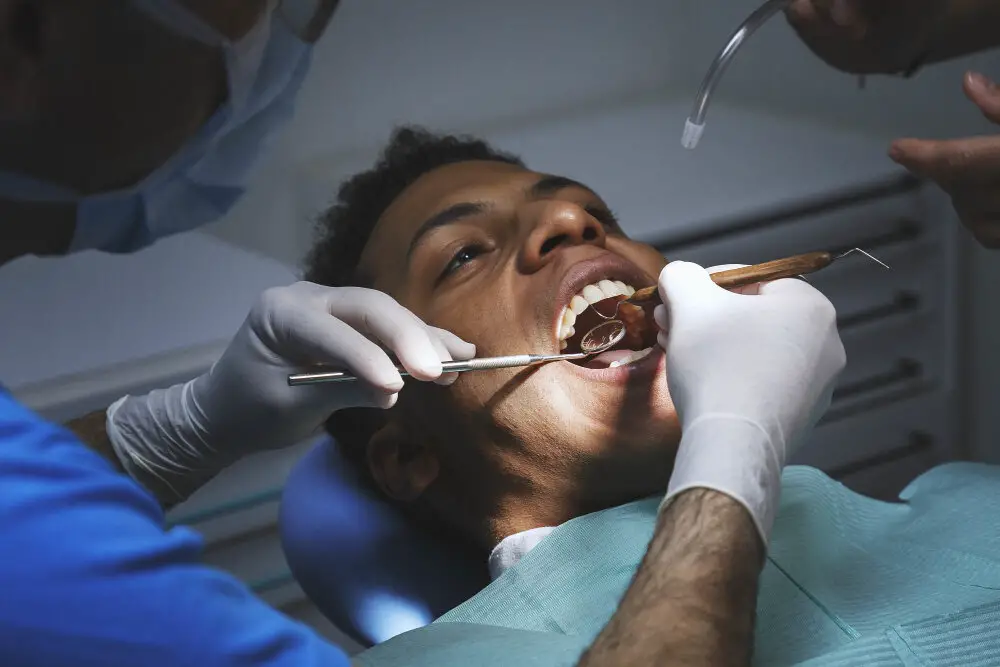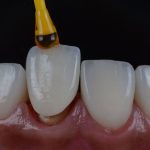Speeding up Recovery: Numbness after Wisdom Teeth Removal How Long is Normal?

Wisdom teeth removal is a common surgical procedure that most people undergo at some point in their lives. While the procedure itself is relatively straightforward, the recovery process can be uncomfortable and sometimes painful. One of the most common side effects of wisdom teeth removal is numbness in the mouth and face, which can be a cause for concern for many patients. If you are experiencing numbness after wisdom teeth removal, it is important to understand what is normal and what is not, and how you can speed up your recovery. Numbness after wisdom teeth removal is usually caused by the anesthesia that is used during the procedure. The anesthesia can affect the nerves in your mouth and face, causing temporary numbness. In most cases, this numbness will go away on its own within a few hours or days. However, in some cases, the numbness can last for several weeks or even months. This can be a cause for concern for many patients, as they may worry that there is something wrong with their nerves or that the numbness is permanent. In this article, we will explore the causes of numbness after wisdom teeth removal, how long it is normal for the numbness to last, and what you can do to speed up your recovery.
Wisdom teeth removal is a common surgical procedure that involves the extraction of the third molars located at the back of the mouth. These teeth often cause problems such as overcrowding, impaction, infection, and decay, leading to pain and discomfort. The procedure is performed under local or general anesthesia, depending on the patient’s preference and the complexity of the case. During the surgery, the dentist or oral surgeon makes an incision in the gum tissue to expose the tooth and then removes it using forceps or a drill. After the procedure, the patient may experience pain, swelling, bleeding, and numbness, which are normal and typically subside within a few days to a week. Proper post-operative care, such as rest, ice, pain medication, and avoiding hard, sticky, or spicy foods, can speed up the recovery process and minimize complications.
It is not uncommon to experience numbness after wisdom teeth removal, as this procedure can cause trauma to the nerves in the affected area. The sensation of numbness can vary in severity and duration depending on the individual case. In most cases, the numbness is temporary and resolves on its own within a few hours or days. However, in more severe cases, the numbness can last for several weeks or even months. It is essential to keep the affected area clean and follow the post-operative instructions provided by your dentist or oral surgeon to ensure a speedy recovery and minimize the risk of complications. If you are experiencing numbness for an extended period, it is advisable to consult your healthcare provider for further evaluation and treatment.
Recovery speed is of utmost importance when it comes to any medical procedure, including wisdom teeth removal. The process of recovering from wisdom teeth extraction involves a lot of pain, swelling, and numbness. The faster the recovery speed, the quicker the patient can return to their daily routine. It is important to note that recovery speed varies from person to person, and there is no one size fits all approach. However, the use of ice packs, taking prescribed pain medication, and following the post-operative instructions given by the dentist can help speed up the recovery process. It is essential to monitor the recovery progress and consult with the dentist if there are any concerns or complications. In conclusion, the recovery speed plays a crucial role in the healing process, and proper care and attention can help ensure a faster and smoother recovery.
What is Numbness?

Numbness is a sensation of loss of touch or sensation in a particular part of the body, usually caused by nerve damage. It can occur due to various reasons, such as injury, poor circulation, or compression of the nerves. In the context of wisdom teeth removal, numbness is a common side effect that patients experience. The removal of wisdom teeth involves cutting through the gums and extracting the teeth, which can cause trauma to the nerves in the area. It is normal to experience numbness in the tongue, lips, and cheeks after the procedure, which can last for several hours or even days. However, if the numbness persists beyond a week or two, it is important to seek medical attention, as it may indicate nerve damage that requires further treatment. While numbness after wisdom teeth removal is a normal occurrence, it can be a cause of concern for patients who are experiencing it. It can interfere with daily activities such as eating, drinking, and speaking, and can cause discomfort and anxiety. To speed up the recovery process, it is important to follow the post-operative instructions given by the dentist, such as avoiding hot and spicy foods, smoking, and drinking through a straw. Applying ice packs to the affected area can also help reduce swelling and inflammation, which can alleviate numbness. In some cases, medication may be prescribed to manage pain and discomfort. It is important to be patient and give the body time to heal, as numbness after wisdom teeth removal is a temporary condition that typically resolves on its own within a few days.
Numbness is the loss or reduction of sensation in a particular part of the body, often caused by nerve damage or compression. It can be experienced as a tingling, prickling, or dull sensation, and can occur in varying degrees of severity. Numbness after wisdom teeth removal is a common occurrence due to the proximity of the nerves in the jaw, which can be irritated or damaged during the procedure. While some degree of numbness is to be expected following surgery, it is important to monitor the length of time it persists, as prolonged numbness may indicate a more serious issue.
Numbness after wisdom teeth removal is a common occurrence and can be caused by a variety of factors. One of the main causes is nerve damage during the extraction process, which can cause temporary or permanent numbness in the mouth, tongue, or lips. Another cause is swelling around the nerves, which can also lead to numbness. In addition, anesthesia used during the procedure can cause numbness that may take several hours to wear off. It is important to follow post-operative instructions carefully and avoid smoking, drinking through a straw, or eating hard or crunchy foods to prevent any further damage or prolong the numbness.
Numbness after wisdom teeth removal can be a concerning and uncomfortable experience for many patients. While the duration of numbness can vary from person to person, it typically lasts for several hours to a few days. In some cases, however, numbness can persist for weeks or even months, which can be indicative of nerve damage. It is important to consult with your dentist or oral surgeon if you experience prolonged numbness, as they can help to determine the underlying cause and recommend appropriate treatment options. Additionally, practicing good oral hygiene and avoiding strenuous physical activity can help to promote a faster recovery and reduce the risk of complications following wisdom teeth removal.
Speeding up Recovery

After having a wisdom tooth extraction, a common side effect is numbness in the surrounding area. This can be a cause of concern for many patients, as it can affect daily activities such as eating and speaking. However, there are ways to speed up the recovery process and minimize the duration of numbness. One of the most effective methods is to apply a warm compress to the affected area. This can increase blood flow to the area and promote faster healing. It is important to note that the compress should not be too hot, as this can further damage the tissues and slow down the recovery process. In addition to warm compresses, there are several other things that patients can do to speed up recovery. Eating soft foods and avoiding hard or crunchy foods can prevent further irritation to the affected area. Staying hydrated can also help to flush out any toxins and promote healing. It is important to follow the aftercare instructions provided by the dentist or oral surgeon, which may include taking pain medication or antibiotics. With proper care and attention, most patients can expect to recover from wisdom tooth extraction within a week or two, and the numbness should subside during this time as well.
There are several home remedies that can help speed up recovery after wisdom teeth removal, reducing the discomfort and numbness experienced. One effective remedy is to apply an ice pack to the affected area intermittently for the first 48 hours to reduce swelling and inflammation. Additionally, gargling with warm salt water can help keep the wound clean and promote healing. Avoiding smoking, alcohol, and crunchy, hard foods can also aid in recovery. Drinking plenty of water, taking pain relief medication as prescribed, and getting enough rest are also important factors in a speedy recovery. As always, it is important to consult with a healthcare professional before attempting any home remedies.
Numbness after wisdom teeth removal is a common occurrence, but there are a few tips that can help reduce the discomfort. Firstly, applying an ice pack to the affected area for 15-20 minutes at a time, several times a day, can help reduce swelling and inflammation that may be contributing to the numbness. Secondly, taking over-the-counter pain relievers as prescribed by your dentist can help manage any pain or discomfort associated with the numbness. Finally, avoiding hot foods and drinks for the first few days after the procedure can also help reduce the risk of further inflammation and discomfort. By following these tips, patients can help speed up their recovery and reduce the duration of numbness after wisdom teeth removal.
Proper nutrition is important when recovering from wisdom teeth removal surgery. It is recommended to eat soft, easy-to-chew foods like mashed potatoes, soup, smoothies, and oatmeal. Foods high in protein like eggs, chicken, and fish can also aid in the healing process. It is best to avoid crunchy, hard, and sticky foods like nuts, chips, popcorn, and candy as they can irritate the surgical site and delay healing. Additionally, acidic and spicy foods should be avoided as they can cause discomfort and inflammation. It is important to maintain a balanced and nutritious diet to promote a speedy recovery and ensure overall health.
When to Seek Medical Attention?

When it comes to wisdom teeth removal, it is normal to experience some numbness in the mouth and surrounding areas. However, if the numbness persists for an extended period or is accompanied by other symptoms, it may be time to seek medical attention. If you notice swelling, redness, or excessive bleeding, it is important to contact your dentist or oral surgeon immediately. These symptoms may indicate an infection or other complication, which can delay the healing process and cause further discomfort. Additionally, if you experience severe pain or difficulty opening your mouth, it is best to seek medical attention right away. These symptoms may be a sign of nerve damage or other serious issues that require immediate intervention. It is also important to seek medical attention if your symptoms do not improve over time. While some numbness is normal after wisdom teeth removal, it should gradually improve within a few days or weeks. If you notice that your symptoms are getting worse or are not improving, it may be time to see your dentist or oral surgeon. They can evaluate your condition and determine if additional treatment is necessary. By seeking medical attention promptly, you can help speed up your recovery and ensure a smooth healing process.
It is important to keep an eye out for any warning signs after wisdom teeth removal to ensure a smooth recovery process. Some common warning signs to look out for include excessive bleeding, intense pain that does not subside with medication, swelling that worsens after several days, persistent numbness, fever, and difficulty breathing or swallowing. If any of these symptoms are experienced, it is important to contact your dentist or surgeon immediately, as they may be indicative of an infection or other serious complication. By monitoring your recovery progress and seeking prompt medical attention when necessary, you can help ensure a successful and comfortable recovery after wisdom teeth removal.
Following up with your dentist or oral surgeon after wisdom teeth removal is crucial for a speedy and successful recovery. These appointments allow professionals to monitor your healing progress and ensure there are no complications or infections. They can also provide additional guidance on pain management and proper oral hygiene to prevent further discomfort or issues. Skipping or delaying follow-up appointments can lead to prolonged recovery time, increased pain, and ultimately, a less satisfactory outcome. It’s important to prioritize these appointments to ensure a smooth and efficient recovery process.
Prolonged numbness after wisdom teeth removal could be a sign of nerve damage, which can be a concerning issue that requires immediate medical attention. Possible treatments for prolonged numbness include medications such as nonsteroidal anti-inflammatory drugs (NSAIDs) to manage discomfort and inflammation and nerve medications like gabapentin or carbamazepine to help alleviate neuropathic pain. Physical therapy may also be recommended to help increase blood flow to the affected area and promote healing. In severe cases, surgery may be required to repair or remove the damaged nerve. It is essential to consult with a healthcare professional to determine the best treatment options for prolonged numbness after wisdom teeth removal.
A speedy recovery after any medical procedure, including wisdom teeth removal, is crucial for many reasons. Firstly, it can reduce the risk of complications such as infections, bleeding, and prolonged pain. Secondly, it allows the patient to resume their normal daily activities, including work, school, and exercise, sooner. This can be particularly important for individuals with busy schedules or those who rely on physical activity for their mental health and well-being. Additionally, a faster recovery can lead to a better overall experience for the patient, reducing stress and anxiety associated with prolonged discomfort or limited mobility. Therefore, it is essential to follow post-operative instructions carefully and seek medical attention if necessary to ensure a speedy recovery.
In conclusion, numbness after wisdom teeth extraction is a common occurrence that can last for several days or even weeks. However, if you experience prolonged numbness or severe pain, it is advisable to consult your dentist immediately. To speed up the recovery process, you can try using warm compresses, avoiding hard or crunchy foods, and taking painkillers as prescribed. It is also essential to maintain good oral hygiene by gently brushing and flossing your teeth to prevent infection. Lastly, be patient and give your body time to heal, as the recovery period varies from person to person. With these tips and proper care, you can ensure a smooth and speedy recovery from wisdom teeth extraction.
Conclusion

In conclusion, experiencing numbness after wisdom teeth removal is a common occurrence that can last up to a few hours or even days. However, if the numbness persists for an extended period or is accompanied by other concerning symptoms, it is essential to seek medical attention promptly. Taking proper care of your oral health, following postoperative instructions, and avoiding activities that may delay the healing process can help speed up recovery and reduce the likelihood of complications. Remember, patience, and proper care are crucial for a successful recovery after wisdom teeth removal.







